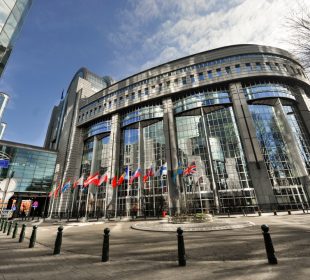CO2 emitted by transport, farming, buildings and waste must be cut by 30% across the EU; CO2 emitted and absorbed by forestry and land use must balance out, by 2030.
These are the aims of two draft EU laws adopted on Tuesday.
EU targets are to be turned into binding national targets for sectors which are not covered by the current EU Emissions Trading Scheme, i.e. agriculture, transport, building and waste, which together account for about 60% of the EU’s greenhouse gas emissions.
These cuts will contribute to meeting the EU’s overall collective pledge, under the Paris Agreement on climate change, to deliver a 40% cut in greenhouse gas emissions in all sectors, from 1990 levels.
“We have done our best to agree an ambitious European climate action regulation, despite the attempt of many EU governments to undermine ambition” said lead MEP Gerben-Jan Gerbrandy (ALDE, NL). “Thanks to pressure from the Parliament, we have succeeded in lowering the allowed carbon budget with the emissions of about four million cars. European governments will have to do more, and they will have to do it earlier. Delaying climate action is no longer possible, this regulation requires all governments to speed up green investments to tackle emissions from agriculture, transport, waste and buildings.” he said.
Forestry as a tool to counter climate change
Parliament also adopted a separate law, aiming to cut greenhouse gas emissions from land-use and forestry and boost the level of emissions absorbed by forests as a way to tackle climate change. Currently, EU forests absorb the equivalent of nearly 10% of total EU greenhouse gas emissions each year.
The proposed law would lay down rules under which EU countries have to ensure that deforestation is balanced by planting new trees, and sets measures to develop the sector in order to boost CO2 absorption by forests, croplands and grasslands. MEPs bolstered these provisions by adding that from 2030, member states should boost CO2 absorption to exceed emissions, in line with the EU’s long-term objectives and the Paris Agreement.
“LULUCF is about the positive contribution of agriculture and forestry to combating climate change” said rapporteur Norbert Lins (EPP, DE). “Parliament has worked to strike a balance between flexibility and comparable accounting rules for the 28 Member States. I am convinced that we have succeeded in strengthening the bioeconomy - wood for house building, furniture and bioenergy (...) With this legislation we are sending out a signal: we want our forests in Europe to continue to be managed sustainably. We want to continue to maintain strong forestry in Europe.” he said.
Next steps
The legislation on effort sharing was adopted with 343 votes to 172 and 170 abstentions, while the text on LULUCF was adopted with 574 votes to 79 and 32 abstentions. Both texts need Council´s formal approval before entering into force.



